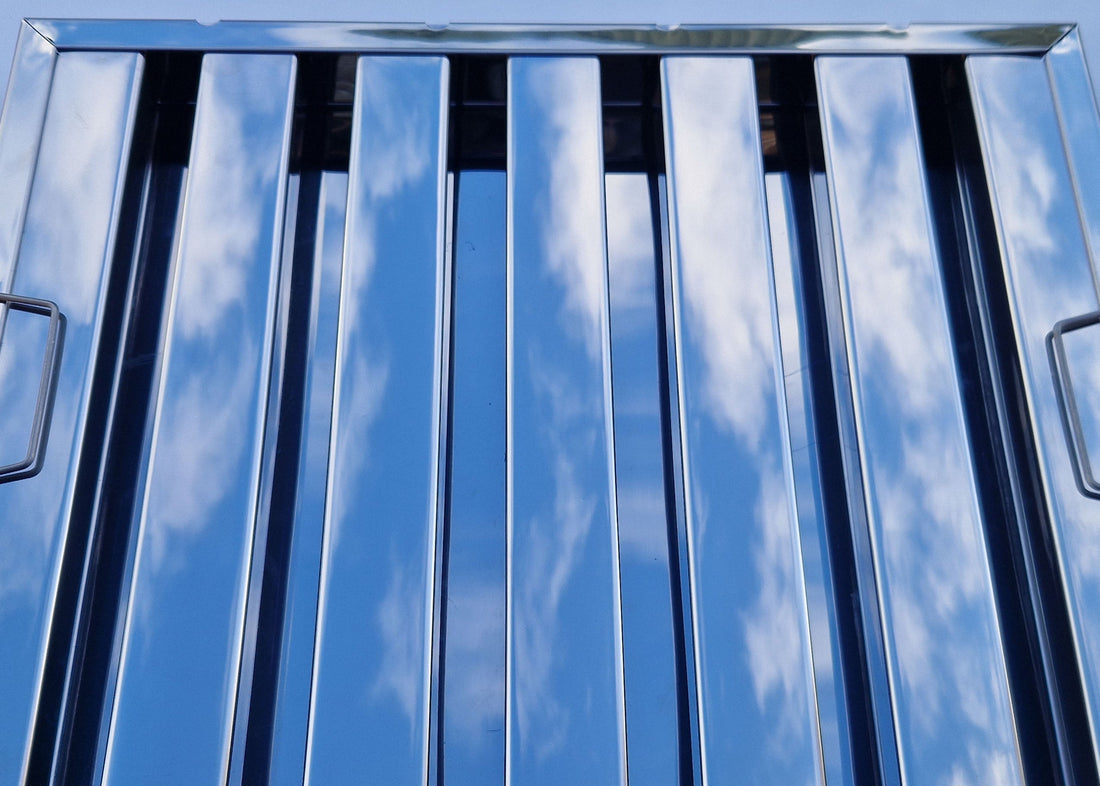
What is a Canopy Filter?
Canopy filters are known by many different names, including kitchen filter, cooker filter, grease filter, cooker hood filter, and even baffle filter, and they are designed to capture grease, filter airborne particulates and even stop flames from entering the extraction ducting, helping to keep the air clean that is eventually sent outside.
We deal with three different types of canopy filters: grease filters, baffle filters, and Dual Premium, which is a combination of the previous two filters. In this blog post, we are going to concentrate on BAFFLE FILTERS and will discuss the others in subsequent blog posts.
These baffle filters offer two functions; the primary function is to reduce or eliminate flames from the cooking area entering the extraction ducting. The secondary function is to capture grease, stopping it from reaching the ducting where it will line the ducting surface, resulting in an increased fire risk if the area isn’t cleaned regularly.
Maintaining airflow within the working area is vital to ensure that the air is removed from the kitchen. Baffle filters have a very low pressure drop, so they will not interfere with the movement of the air being extracted. The standard pressure drop for our baffle filters is approximately 190 Pa (pascals) with an airflow of 1.5 metres per second, and this doesn’t change during the use of the filter. This low pressure drop is made possible by the design of the filter, which consists of two banks of baffles (or plates) which are offset from each other. For the air to pass through the filter, it can’t travel in a straight line but travels around the baffles, and it is this diversion that stops the flames from reaching the ducting and allows the baffles to capture grease and other particulates and contaminants. The fold-down handles, which we fit to the outer frame, won’t interfere with the airflow provided that they are folded back into their prone position when the filter is in its canopy.
To keep the baffles working to their maximum efficiency, they should be cleaned on a regular basis to remove carbon deposits and the buildup of grease and other waste materials. Regular cleaning will make the process quick and easy. The material from which the filter is constructed, we only use a polished and scratch-free stainless steel for baffle filters, which also helps with cleaning as it is smooth, so cleaning is much easier than with other materials such as mild steel or galvanised materials. Stainless steel also gives a very long working lifespan. We also have drain holes in the outer frame, which allow the filter to drain after washing. If cleaned regularly, the filters should require only rinsing with hot water and a mild detergent, they should be allowed to drain and shouldn’t be returned to the canopy until they are completely dry.
Finally, when should you use a baffle filter, and when should you use a grease filter or should you be using a combination of both? The choice of which canopy filter to use is really determined by the type of cooking that is being done in the immediate area, so if the extracted air is potentially going to be heavily contaminated with grease, then a grease filter will be more suited than a baffle filter. For the extraction of air from fryers or areas where oil is commonly used or where the food produces oil and possibly smoke, a grease filter should be used. If the possibility of a flame is unlikely, then again, a grease filter should be used. Alternatively, if flame is more likely and the production of oil/grease is very low, then a baffle filter may be more suited. Finally, if both oil/grease and flame are likely, then it may be prudent to install a Dual Premium, which will capture grease and offer fire protection.
Our canopy filters are available in a wide range of standard sizes, many of which are ready for immediate dispatch. For the grease filters and Dual Premium, you have a choice of construction materials, but our baffle filters are only available in stainless steel. We can have the filters manufactured to your bespoke sizes so, if you don’t see the size of filter that you require, then contact us on +44(0) 1673 895130 or visit out Contact Us page where you can complete a contact form with the details of the filters you require or any questions you may have for us.
